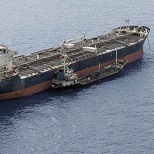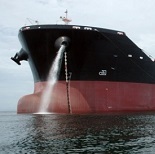Vessel arrest and detention in Georgia. Part 3
We believe that in order to secure claim it is not important for Georgian court which considers such claim, whether such dispute in fact shall be settled by court or by arbitration beyond Georgia. We can state that the abovementioned provision of competence of Georgian courts shall be spread over the cases when the dispute in fact shall be settled by arbitration (arbitration proceeding) beyond Georgia. In both cases Georgian court which considers the claim on arrest shall be limited to formal control over competence of the body which considers the claim in fact. In particular, it shall state by virtue of the submitted evidence that the dispute between the parties is actually initiated by the authority provided by the agreement of the parties or by the law applied to the present dispute.
Compliance with the present requirements expands jurisdiction of the authorized courts of Georgia and empowers them to consider applications on vessel arrest in cases when the proceeding was initiated at the arbitration court beyond Georgia.
When the court of Georgia has no international competence in the dispute, the jurisdiction thereof is grounded on the International Doctrine on taking security measures. Private international law has two approaches to taking security measures to the property beyond the country which considers the claim:
- application of standards of the country which considers the claim (lex fori);
- application of standards of the country where the defendant’s property is located (lex rei sitae).
Taking into account essence and purpose of security measures as a law institute, it is reasonable to take security measures in such legal system which contains the subject of potential security. It would allow to avoid any legal conflict between legal systems of taking and enforcing security measures. We used successfully such argument in practice, in case upon detention of the vessel staying at the port of Poti but sailing under the foreign flag (Ruling of the Kutaisi Appeal Court upon the Case No.2/Б-352-2013 on arrest of the bulk carrier m/v ELIF, flag of Togo). The parties under the present dispute were non-residents of Georgia and the proceeding was initiated by the London Maritime Arbitrators\' Association (LMAA).
Procedural grounds for vessel arrest
In respect of the present issue we need to remind that application of the Civil Procedural Code of Georgia as the procedural argument of vessel arrest shall be mandatory in compliance with Article 831 of the Maritime Code. Taking into account structure of the Civil Procedural Code, vessel arrest can be performed in order to secure a maritime claim only, i.e. application on vessel arrest shall be considered under the procedure prescribed for cases of considering application of the concerned party upon claim security.
According to Article 191 of the Civil Procedural Code, the concerned party may file an application on taking claim security measures to the authorized court. Application must contain the circumstances due to which failure to take claim security measures may complicate or make impossible enforcement of the potential court decision in favour of the concerned party. Also application must state which measures shall be deemed as necessary for claim security.
Such application may be filed to the court also in the process of case consideration and even before filing a claim to the court, if necessary. Vessel arrest procedure is usually based on the urgency of security measures. Practice shows that claim on vessel arrest shall be filed before start of case consideration. We have already mentioned that in fact in case of vessel arrest in Georgia the court may be competent at the stage of taking security measures.
If the court makes a ruling on taking security measures before commencement of claim in fact, it shall set the 10-day term of filing a claim to the competent court. The law does not state the certain court but in fact it supposes the authorized court of Georgia. But for the purpose of international proceeding it supposes the court of Georgia with the corresponding international competence. After expiration of the stated term the court shall cancel security measures at its own discretion or under the party’s application. Prolongation of the 10-day term of preliminary security measures is not presumed.
Application on security measures shall be considered by the court within one day without notifying the defendant. This provision states that the applicant’s substantive grounds for vessel arrest are prejudicial, i.e. circumstances stated by the concerned party and based on evidence submitted at court shall be deemed as complete and undisputable unless the opposite party proves otherwise.
The court ruling may be disputed by the concerned party at the appeal court within 5 days from the moment of handing the ruling to the concerned party. Prolongation of the present term is not admitted.
In Georgia the court ruling on taking security measures shall be enforced immediately, according to the rule of enforcement, and appeal against such ruling shall not cease enforcement thereof.
The court denial in taking enforcement measures, the court ruling on cancellation of security measures or replacement of one security form by another may be appealed against within 5 days from the moment of handing the ruling to the concerned party.
The court shall determine forms of security measures enforceable in certain cases on the basis of forms set forth in the law. Such list does not contain vessel arrest as security form. The present article provides property arrest and prohibition for the defendant to perform certain actions.
Application of the parties allows substitution of one security form by another. In case of vessel arrest the defendant may deposit the amount required by the claimant to the court’s account as the appropriate claim security form. Other forms of replacing vessel arrest by other enforcement measures, such as banking guarantee, P&I club guarantee or any others, may also apply. They also continue the forms not provided by the law of Georgia, because taking thereof by the court depends completely on the party required for vessel arrest.
Practical and doctrinal problems regarding vessel arrest
According to the Georgian practice in common cases of settling the issue of security claim satisfaction, courts rely on the following criteria.
Taking into account actual case circumstances, the court must presume that the claim probably could be satisfied.
Security measures shall serve as the opportunity to prevent potential obstacles of actual enforcement of the decision, as property guarantee of the claimant’s violated rights and as the opportunity to restore such rights.
Security measures shall defend the claimant’s legal interests against the defendant’s malpractice.
The decision on security claim satisfaction shall be made individually on the basis and actual and legal case circumstances.
In virtue thereof, the court shall have grounded suggestion that failure to take security measures would complicate or make impossible enforcement of the court decision in favour of the claimant.
It is obvious that the abovementioned criteria contradict to the goals of the vessel arrest institute provided by the corresponding international conventions. According to the practice stipulated by the Conventions dd. 1952 and 1999, vessel arrest shall be deemed as neither enforcement nor liability but only as maritime claim security measure and it does not include measures taken in order to enforce the valid court decision or arbitration award.
As opposed thereto, according to the civil procedural doctrine of Georgia and several ex-USSR countries (Ukraine, Russia), security measures shall be taken for the purpose of enforcement of the valid court decision or arbitration award regarding security.
Almost all court rulings on security measures contain such provision. For example, explanations of the Kutaisi Appeal Court upon the Case No.2/Б – 907 (Ruling dd. 22.10.2010) state that claim security measure shall serve as guarantee of specific enforcement of court decision upon claim enforcement and elimination of obstacles. It shall serve as guarantee of the party’s property interests and as complete restoration of impaired rights. There is no sense to recognize the impaired rights (i.e. court decision) unless restoration thereof shall be secured.
Due to absence of special regulations, in respect of substantive grounds for vessel arrest, there is a vital issue of determining the essence of maritime claim. We have already mentioned that Georgia is not a party to the corresponding international conventions, so the substantive grounds for vessel arrest are:
a) Article 43 of the Maritime Code of Georgia;
b) Maritime Code in respect of private law relations;
c) general principles of the law of obligations set in the Civil Code of Georgia which may justify commercial navigation claims.
Anyway, in certain situation vessel arrest as security measure shall depend on subjective arguments of a certain court which often contradict to the standard meaning of maritime claim. Typical example is the case of denial in vessel arrest by the Poti City Court (Case No.030210013237892 dd. 29.05.2013 upon m/v Koymeler). The court denied in vessel arrest under the typical maritime claim (i.e. incomplete payment of bunker cost with multiple delays) on the grounds of small amount of the claimant’s demands as compared to potential cost of the vessel. The court stated that the ship owner would unlikely sell the vessel due to small indebtedness. Such conclusion confirms presumption that in respect of vessel arrest satisfaction the courts treat vessel arrest not as separate institute of international law but as common civil proceeding. It confirms inefficiency of the current legislation for development of vessel arrest institute in Georgia.
Definition whether the certain claim shall be deemed as maritime claim is either the main obstacle in performing vessel arrest or the argument of vessel release if you defend the second party as the attorney-at-law.
Nevertheless the Conventions dd. 1952 and 1999 are the higher standards of plurilateral regulation of both procedural and substantive aspects of vessel arrest than the national legislation of Georgia. Therefore we try to implement the issues unsettled imperatively by the domestic law into the legal framework by means of single practice.
Guarantees for the ship owner
In case of vessel arrest as security measures, the Georgian law provides defense of ship owner’s interests. According to Article 58 of the Law of Georgia on Private International Law, foreign citizens and legal entities involved in civil proceedings within the jurisdiction of Georgia have the same legal guarantees as legal entities and natural persons residing in Georgia. On the basis of this fundamental principle, defense of the rights of ship owners and charterers of arrested vessels shall be provided by the current legislation. In particular, if the court believes that in taking security measures the ship owner may suffer damages, the court may satisfy the claim on taking security measures but it may ask the applicant to provide appropriate compensation for any expected injury. The court can make such decision after vessel arrest, under the ship owner’s application. In such case the claimant shall compensate possible damages to the possible defendant within 7 days. In case of failure to perform it, the court shall make immediately the decision on cancellation of security measures and the arrested vessel is subject to release. The decision may be disputed at the appeal court.
If security measures are deemed as groundless by virtue that either demands of the claimant (the concerned party) were denied and the decision entered into force, or the claimant failed to file claim to the competent court for claim consideration and the court cancelled security measures, the party in favour of which the vessel was arrested is obliged to compensate damages to the other party suffered due to vessel detention.
The specific feature of the present provision is that the law contains no criteria regarding the type, amount, terms of security which are necessary for the court in order to define the amount of possible damage compensation. In practice the court defines such amount on the basis of calculations submitted by the parties.
Conclusion
Having analyzed the Georgian legislation we may summarize that:
1. Sea vessel arrest and release is possible only upon the decision (ruling) of general courts of Georgia which are competent in taking claim security measures including vessel arrest, if such vessel is within the jurisdiction of Georgia, even if the Georgian court is not competent for considering the dispute arisen from maritime claim in fact. The competence of the Georgian court which took security measures may be spread over the dispute in fact, as the parties agree.
2. Sea vessel arrest in Georgia is possible only for the purpose of maritime claim security stipulated by the Maritime Code of Georgia as well as under other binding civil claims regarding the vessel. Here we should emphasize that maritime claims contained in domestic acts of legislation of Georgia may differ from the list of maritime claims set forth in the Conventions dd. 1952 and 1999.
3. Rules of vessel arrest with relevant procedural problems arising due to arrest shall be governed by the Civil Procedural Code of Georgia.
4. Procedural rules of vessel arrest provide guarantees for defense of interests of ship owners and charterers (lawful users). One of them is guarantee or security provided at the request of court or opposite party in the amount set by the court, in order to compensate possible damages caused by vessel arrest.
Taking into account the debtor’s (defendant’s) rights on the vessel it represents, vessel arrest in the jurisdiction of Georgia is possible in the following cases:
- if the registered ship owner is the debtor;
- if the debtor is the bareboat charterer;
- in case of arrest of another vessel belonging to the same ship owner the claims are set against.
Vessel arrest is impossible if the debtor is not the registered ship owner but the beneficiary ship owner.
So vessel arrest in Georgia, like in any jurisdiction, is not simple even for experts. It is typical for private international law relations in whole that each jurisdiction has its own peculiarities. Relations between the parties involved in the vessel arrest procedure are usually quite difficult. The arrest may cause situation which is difficult to settle by legal means, so the arrested vessels may stay idle for months. Therefore we usually advise the parties not to escalate the situation and to search for compromise timely, trying to avoid vessel arrest.
© A. Nitsevych, 2013
Partner, Attorney-at-law
Head of the Nautical Institute of Ukraine, MNI
Interlegal
Ukraine, Kiev – Odessa
© P. Kopaleishvili, 2013
p.kopaleishvili@arbitration.com.ge
Managing partner
Marine Legal Adviser, Georgia
Specialy for "Transport" magazine
(1).png)
Cargo transportation by sea is one of the most reliable and most expensive methods of goods delivery worldwide. Sea lines are one of...

A NEW INITIATIVE BY THE MINISTRY OF TRANSPORT AND INFRASTRUCTURE The new regulation that entered into force in 28 April 2021 has impo...

Dear colleagues, Here is Quarterly Shipping newsletter broght to you by Interlegal. Let us present the most valuable cases and n...

The issue of the port and berth safety is among those which raise various disputes between the interested parties. As the reasons for declar...

Although travel restrictions are beginning to ease, there are still restrictions in many countries impacting on crew changes. The new clause...
 Ship arrest in Ukraine: new approaches2020.06.18
Ship arrest in Ukraine: new approaches2020.06.18The concept of one shipowner – one vessel The concept of one shipowner – one vessel arose due to shipowners’ reasonable desire to secure...

Task The Client – large bunkering company making business in Black Sea Region – applied to Interlegal for debt recovery for bunker supply...

Dear Interlegal clients, Please be informed that in the third quarter of the 2019 year significant changes of Ukrainian legisla...

A presidential decree has been published in the official gazette on 03.05.2019 marking the date on which the 1999 Convention officially beca...
 LMAA arbitration notice clause2019.02.27
LMAA arbitration notice clause2019.02.27The LMAA has published a clause for use in arbitration agreements to facilitate effective notice by email (including for commencement of arb...




 Odessa, 65014, Ukraine, 1 а, Gretska St
Odessa, 65014, Ukraine, 1 а, Gretska St
